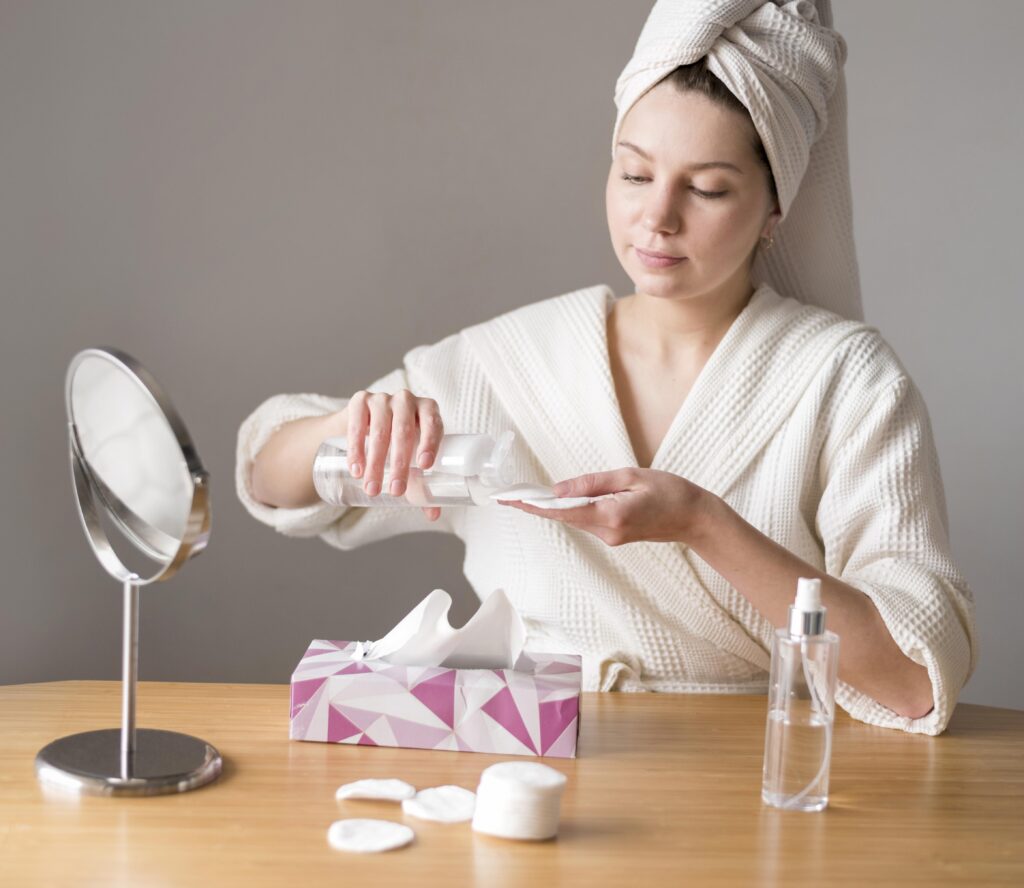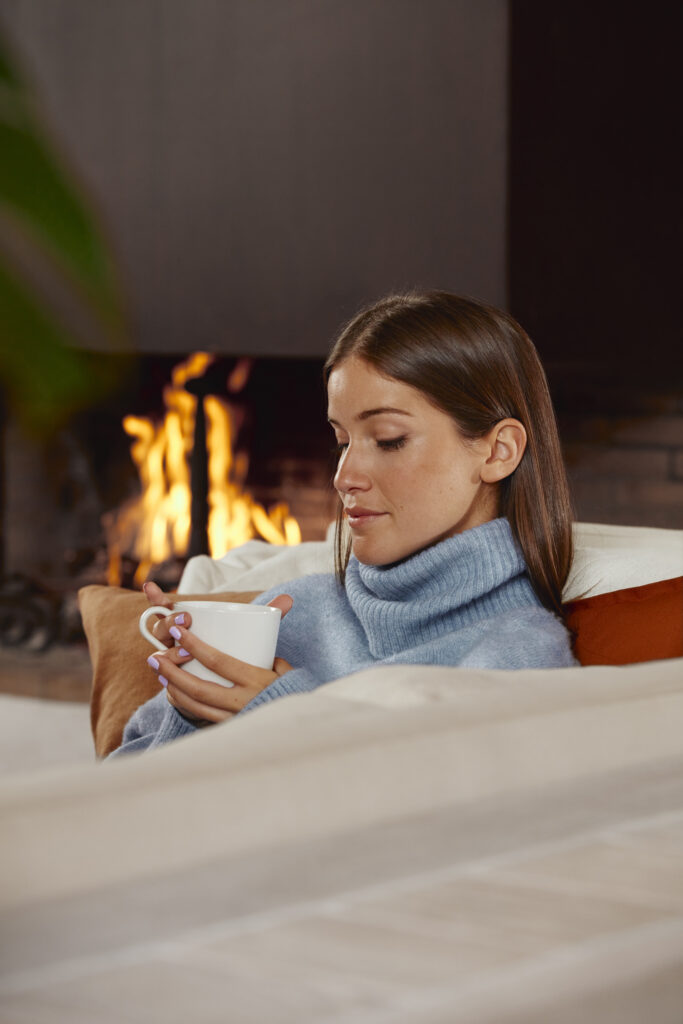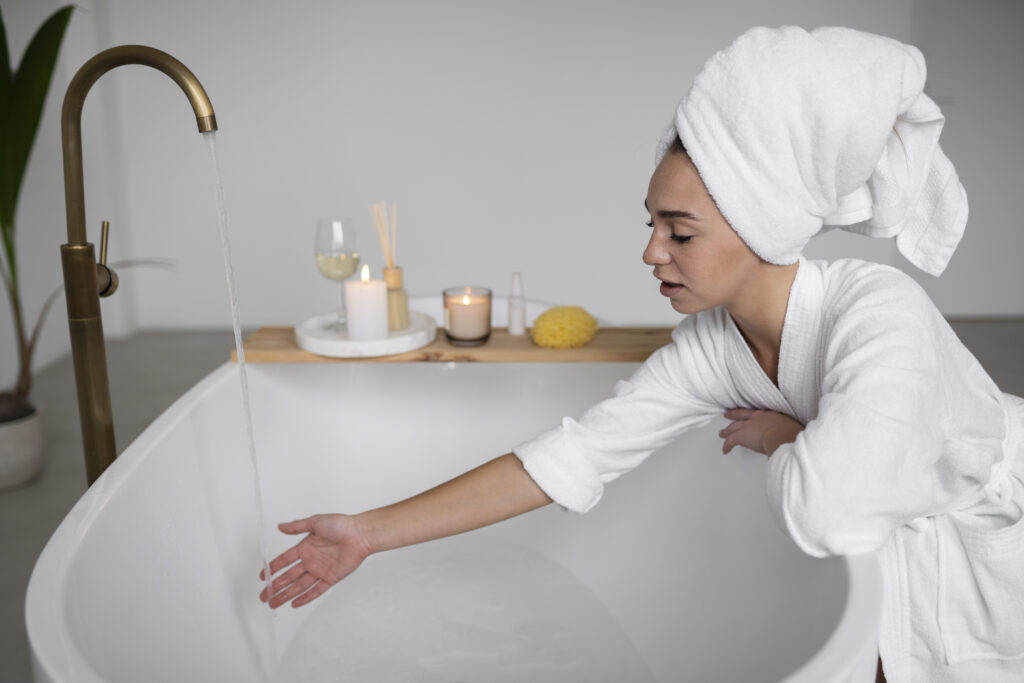Cold air, low humidity, and indoor heating are some of the main reasons people experience skin dryness and eczema flare-ups during the colder months.
Winter air can strip the skin’s natural barrier, leading to irritation and sensitivity. Those living with eczema face additional challenges, as flare-ups are often more frequent and severe when skin becomes dehydrated.
Adopting these five winter skincare tips, such as proper moisturizing, adjusting bathing habits, and protecting skin against harsh conditions, can make a dramatic difference.
By making small but consistent adjustments in your routine, you can protect your skin and reduce the risk of discomfort throughout the season. Let’s explore the 5 most common skincare tips for avoiding dryness in winters.
5 Winter Skincare Tips To Avoid Dryness
Moisturizing is Mandatory in Winter
Moisturizing is one of the most important winter skincare tips because it directly addresses water loss from the skin barrier. Cold winds and low humidity strip away moisture, leaving the skin feeling tight, itchy, or even cracked. A thick, cream-based moisturizer creates a protective shield against these harsh elements. Another key factor is timing.
Dermatologists recommend applying moisturizer within minutes after bathing to trap water in the skin. This step locks in hydration and prevents dryness from worsening throughout the day.
For best results, choose fragrance-free formulas to reduce irritation risks. Moisturizing is not just about comfort; it plays a preventive role. Regular use keeps eczema-prone skin calmer, reducing flare-ups, itching, and redness. It also strengthens the skin barrier, making it more resistant to external triggers like allergens and cold winds.
Choose the Right Cleanser

Cleansing is essential for removing impurities, but during winter, the wrong cleanser can worsen dryness and eczema. Many foaming or alcohol-based cleansers strip away natural oils, damaging the skin’s protective barrier. This often leads to irritation, redness, and tightness after washing.
Switching to cream, gel, or oil-based cleansers is recommended in winter. These formulas clean gently while providing hydration, helping the skin maintain its natural balance.
Dermatologists emphasize avoiding heavily fragranced cleansers, as they can be particularly irritating to sensitive or eczema-prone skin.
It’s also important to consider frequency. Over-washing, especially with hot water, worsens dryness. Limiting face washing to twice a day and opting for lukewarm water protects the skin from over-drying.
Finally, incorporating cleansers with ingredients like ceramides or hyaluronic acid can be beneficial. These support hydration and strengthen the skin barrier, making cleansers not just a cleaning step but also part of the treatment for dry or eczema-prone skin.
Protect Your Skin from Harsh Weather
Exposure to cold winds and low temperatures is one of the main triggers for winter dryness. Covering exposed skin with gloves, scarves, and hats helps minimize direct contact with these harsh conditions. This protective barrier reduces irritation and moisture loss.
Another important Winter Skincare Tip is lip protection. Lips are particularly vulnerable to dryness and chapping, so carrying a hydrating lip balm ideally with SPF prevents painful cracks and peeling.
Even in winter, sunscreen is non-negotiable. UV rays penetrate through clouds and reflect off snow, increasing the risk of skin damage. Daily use of sunscreen not only prevents long-term damage but also reduces the chances of eczema flare-ups caused by sun exposure.
ALSO READ
Does Sunscreen Prevent Skin Cancer? Facts, Benefits & Expert Insights
Manage Indoor Heating Effects

While central heating makes winter comfortable, it dries out indoor air, worsening skin dryness. Humidifiers are highly recommended to restore moisture levels in the environment, making it more skin-friendly.
Keeping heaters at moderate temperatures and avoiding direct exposure also helps. Sitting too close to a heat source can dehydrate skin rapidly, leading to itching and irritation.
Simple adjustments, like keeping a bowl of water near radiators or investing in a portable humidifier, can help maintain balanced humidity indoors, protecting the skin’s barrier function throughout winter.
Adjust Bathing Habits

Hot showers may feel comforting, but they strip the skin of natural oils that keep it hydrated. Instead, lukewarm water is best for preserving skin moisture.
Bathing should also be kept short, ideally 10–15 minutes, to prevent excess drying. Using mild, fragrance-free cleansers reduces irritation and supports sensitive skin.
After bathing, gently pat the skin dry and immediately apply a thick moisturizer. This step seals in hydration and provides long-lasting protection against winter dryness and eczema flare-ups.
What are Special Care for Eczema-Prone Skin
People with eczema need to take extra steps during winter, as flare-ups are more frequent and intense in cold, dry conditions. Using emollient-rich creams or ointments helps protect vulnerable patches from cracking and itching.
Fragrance-free and hypoallergenic skincare products are essential, as harsh ingredients often trigger eczema reactions. Barrier creams are particularly useful for areas like hands, which are exposed to frequent washing and cold air.
Identifying and avoiding triggers such as wool clothing, allergens, and stress plays a crucial role in managing eczema. Consistency in care routines reduces flare frequency and severity.
If flare-ups worsen, medical treatments such as topical corticosteroids or dermatologist-prescribed therapies may be required. Regular follow-ups with a dermatologist ensure proper long-term management.
Final Thoughts
Winter brings unique challenges for skin health, but with the right routine, dryness and eczema flare-ups can be managed effectively. By focusing on hydration, gentle cleansing, weather protection, and mindful bathing habits, you can preserve your skin’s barrier and comfort even in the harshest months.
Eczema-prone skin requires extra attention, but consistent care with emollients, fragrance-free products, and protective measures helps minimize flare-ups. The key is to stay proactive; small daily adjustments go a long way in keeping skin healthy and resilient.
Investing in these winter skincare tips not only prevents discomfort but also supports long-term skin health, allowing you to enjoy the colder season without the
FAQs
Why does my skin get worse in winter?
Winter air has low humidity, which dries out the skin’s natural moisture barrier. Indoor heating worsens the effect, making dryness and eczema flare-ups more common. Protecting the skin with moisturizers and humidifiers helps.
What are the most useful winter skincare tips for every skin type?
The most common winter skincare tips are using glycerine, rose water, vaseline, cocoa butter, shea butter and some natural butters. You can also rely on moisturisers available in the market but make sure to select them according to your skin. But natural skin moisturizers such as oils, butters, and softening agents are more beneficial.
Can sunscreen really help in winter?
Yes, sunscreen is still important in winter. UV rays penetrate through clouds and snow, reflecting onto the skin and causing damage. Daily application reduces dryness and long-term risks like skin cancer.
How often should I moisturize in winter?
Dermatologists recommend moisturizing at least twice daily. Applying right after bathing is most effective, as it locks in hydration and prevents water loss throughout the day.
Are hot showers harmful for eczema?
Yes, hot showers strip away natural oils and worsen skin dryness. For eczema-prone skin, lukewarm water and short showers are best, followed immediately by a thick moisturizer.



Join The Discussion